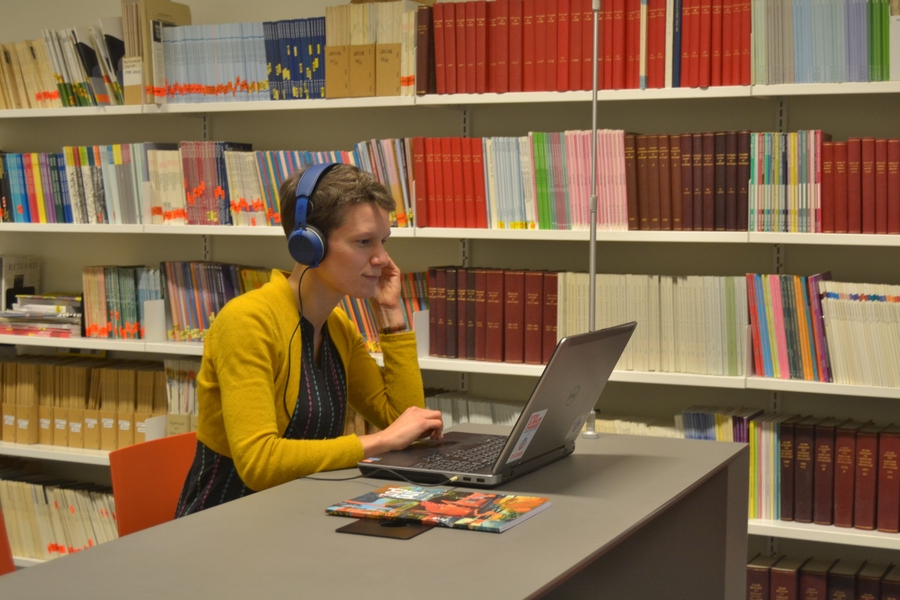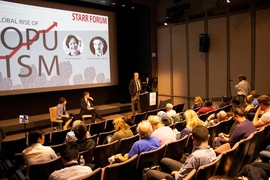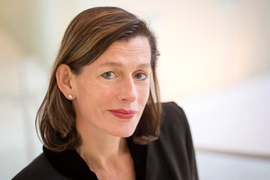While many people might find it difficult, if not downright distasteful, to dive into 1.5 million hours of partisan talk radio, Clara Vandeweerdt found it thrilling.
“Honestly, it’s been one of the most fun things I've had to do in my PhD career,” says Vandeweerdt, a native of Belgium who is in her final year of doctoral studies in political science. “Hearing two points of view on different issues, I’ve gotten to know a side of the U.S. I was unfamiliar with, and it’s been really interesting.”
Vandeweerdt has been analyzing more than a year's worth of talk radio as part of a research agenda focused on political behavior and the various forces that might shape it. Her doctoral research depends on novel data sets and quantitative methods to investigate the impact of social identity and affiliation on political beliefs.
“I am broadly interested in the connection between social groups and identity, and politics,” she says. “Specifically, I want to understand how people use their identities and social groups as shortcuts to arrive at conclusions about complicated political topics, like climate change.”
Talk radio divides us
Real-world events can strongly shape discussion of political topics. But Vandeweerdt wants to understand if and how these events might shift thinking in arenas where ideology has already gripped political thought (think polarizing subjects such as climate change, mass shootings, and immigration). To pursue these questions, Vandeweerdt decided to analyze talk radio — both conservative and liberal media sources — before and after newsworthy events. It was a project she credits to the unexpected emergence “of a really exciting dataset.”
Her singular trove came courtesy of the MIT Media Lab, whose Laboratory for Social Machines generated the RadioTalk corpus — 2.8 billion words of talk radio speech transcripts, generated by natural language algorithms, from October 2018-March 2019. This corpus, containing metadata with geographical location and radio program information, provided Vandeweerdt with the means to interrogate how big news changes media discussion.
Examining word content of 120,000 radio show episodes from 150 U.S. radio stations, Vandeweerdt first determined the shows’ ideological bias. Then, with the help of human coders, she identified speech fragments containing political topics. She searched for major events, seeking to measure the change in quantity of talk on these topics before and after the events. And finally, she analyzed the talk on either side of these events to determine whether there had been any shift in political framing (ideological bias).
With a specific concern for climate change, Vandeweerdt zeroed in on hurricanes as a major news event. Her analysis found “a huge spike in the number of times climate change was mentioned after a hurricane on both conservative and liberal radio shows,” she says. “Unlike many attempts to detect the effect of a real-world event on people's opinions, where you have to fight to make the statistical case, this spike jumped out, with a two-to three-factor increase in the number of times the topic was mentioned.”
Her second finding demonstrated that there was no change in the political framing of the discussion. “Liberal shows remained concerned about climate change, and conservative radio shows remained skeptical, assuring listeners that hurricanes were not a sign of climate change.”
She found a similar rigidity in framing in regard to mass shootings and gun policy, and family separations and immigration policy. Vandeweerdt hopes to delve further into this hard ideological divide, with a follow-up project that examines whether talk radio listeners can shift opinions when exposed to partisan talk that supports or erodes their initial beliefs.
Immovable beliefs
Other research projects Vandeweerdt is pursuing bolster the idea that Americans are not just deeply divided, but dug in. Working with subjects representing 10 different social identity groups (e.g., women, men, African-American, Latinx, LGBTQ), she tested the degree to which information on the impact of certain issues on these groups might drive individuals’ political concerns.
One of her studies showed that even when group members learned that a specific problem powerfully affected their group, their attitude toward political policy related to the problem did not change. For instance, LGBTQ respondents did not change their views about unemployment policy after learning that unemployment was a much greater challenge for LGBTQ group members than for others.
“I found surprising and convincing evidence that these interest cues have very small effects, at most," Vandeweerdt says. “People seem to use group identity to cue them about the right opinion on a topic, but often that opinion does not line up with the material interest of the group.”
Teaching to change minds
Vandeweerdt hopes to harness her twin interests in human and political behavior to effect real change in the world. “People don’t seem cognitively equipped to make decisions about problems like climate change because they are so much bigger than life and hard to relate to,” she says. “My career plan is to use the precise methods of political science to find ways to change people's minds, and convince them to make sure that their opinions are lined up with their values.”
She also views teaching as another means to this end. “Shaping people’s minds, where you can really see the results, is by far the most impactful thing I do,” says Vandeweerdt, who has served as a lecturer and teaching assistant in MIT courses on quantitative methods and public policy, and is currently lecturing at the University of Copenhagen on political behavior and public opinion.
While her research offers fresh perspectives on political discourse and belief in the United States, Vandeweerdt has sometimes found it hard to take the relentless noise and anger in current American politics. So in the midst of analyzing data and writing her dissertation, she found a novel refuge from partisan babble. “One of the things I did to switch it off for a while was improv comedy, which I did with a friend,” she says. The duo’s name: Belgian Waffles.


!["In my view," says MIT Professor Elizabeth Wood, "the core motivation behind [election] interference is Russia's two-fold belief a) that the most important goal of the Russian state is world power status and b) that such status cannot be achieved without recourse to espionage and manipulation."](/sites/default/files/styles/news_article__archive/public/images/201910/MIT-SHASS-elizabeth-wood.jpg?itok=bm2PpSCC)








